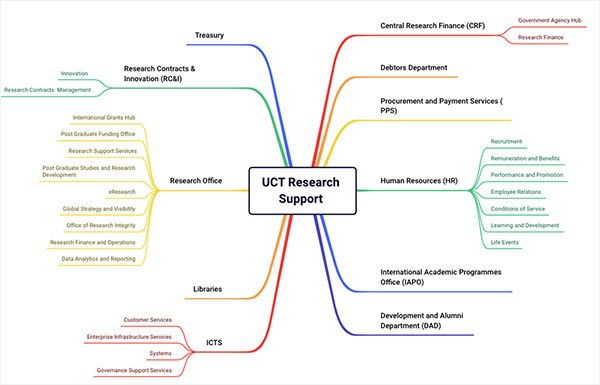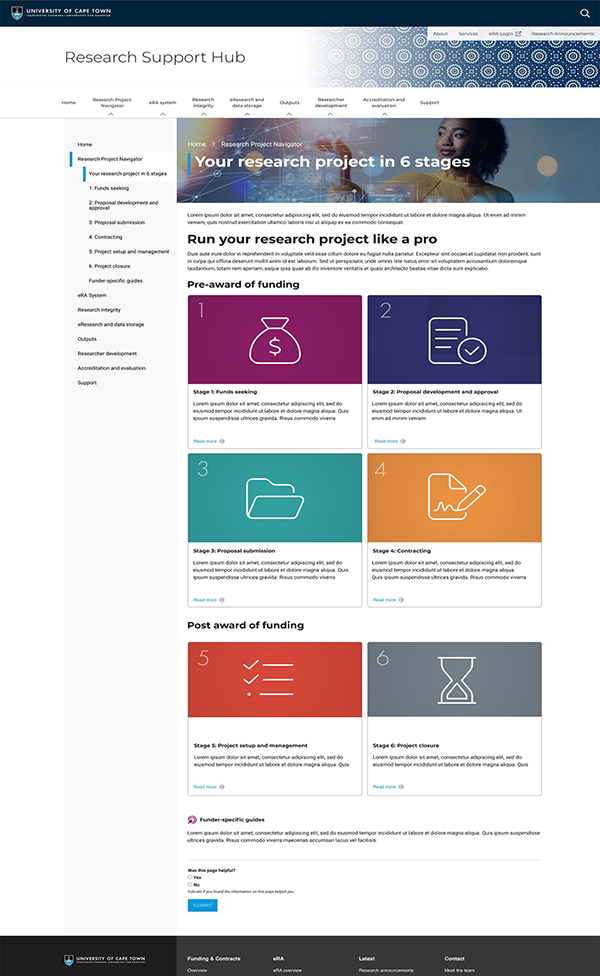Building research support at UCT – introducing the Research Project Navigator
11 January 2024 | Professor Sue Harrison
Dear UCT academics, research staff, postdoctoral research fellows and administrators
Efficient and effective research support is a key component to facilitating research excellence and nurturing research productivity in any university, and equally at the University of Cape Town (UCT). Recognising our research support systems to be lagging, this has been a major focus of the research support team over the past couple of years. A number of service departments and their clusters, located throughout the university, are responsible for providing this research support. Figure 1 outlines the many offices and units which provide research support at UCT.

Figure 1: UCT’s research support infrastructure
Through the Research Support Transformation (RST) project it has become clear that some of the key frustrations and challenges experienced by researchers at UCT is a lack of clarity on who and how to access the appropriate research support and information on this, as well as defining our systems. Clearer more formalised linkages from researchers/research units through faculty offices to central support functions is required, as well as good linkages between the central offices. Providing this is further complicated by the lack of standardisation in the processes with each faculty, each research unit and each funder doing things slightly differently.
To this end, the RST project is working on a number of initiatives for increased visibility of research support on offer to the UCT research community and streamlining these research support systems. One of the key initiatives is the creation of the Research Project Navigator (RPN). This helpful tool is focused on the whole research project lifecycle, from the initial proposal through application to funders, contracting with funders, project management and finally project closure phases, to support the research user through the entire process. It will be housed on the Research Hub website and is co-owned by the Research Office, Research Contracts and Innovation and Central Research Finance to ensure the integrated functioning of research support. It is designed to guide researchers step-by-step through the research project lifecycle, clearly highlighting the support services available at each step and how researchers can access them.
In order to build the RPN, the team conducted a series of process mapping sessions of the research project lifecycle to better understand and document the processes associated with each key step and the nuances of these steps per major type of funding source, eg UCT (internal) or external, applications through funding agencies or negotiations through industry or NGOs, donations or contracts, repetitive or once-off. These processes have been interrogated, streamlined where appropriate and documented. The owner of each component has been identified and the handover actions as the process passes between researcher, faculty and central support offices carefully defined. Together, this forms the basis of the RPN’s system architecture.
Noting the variation in requirements of different funders, the requirements for six of UCT’s major funders (ie the National Research Foundation, National Institutes of Health, Wellcome Trust, South African Medical Research Council, UK Research and Innovation and the European Union) have also been understood and documented in clear standard operating procedures (SOPs) to date, with other major funders set to be added at a later stage.
The focus is on reducing inefficiencies in the process and building in a degree of standardisation and consistency in approach (eg better communication, less duplication). Figure 2 outlines what the research project lifecycle entails as well as what we envision the RPN website landing page will look like.

Figure 2: Envisioned flow of information on the soon to launch RPN webpage
A website Project Implementation Committee consisting of key representatives has been formed to drive the progress of the website. Work on the RPN is ongoing and we hope to go-live early in quarter two of 2024. The RPN will be user-tested towards the end of quarter one. If you would like to get involved in the pilot or for more information on the RPN please contact researchvisibility@uct.ac.za.
We look forward to launching this tool as one of a series of initiatives to build more efficient and available research support at UCT.
With best wishes
Professor Sue Harrison
Deputy Vice-Chancellor: Research and Internationalisation
Read previous communications:
 This work is licensed under a Creative Commons Attribution-NoDerivatives 4.0 International License.
This work is licensed under a Creative Commons Attribution-NoDerivatives 4.0 International License.
Please view the republishing articles page for more information.








